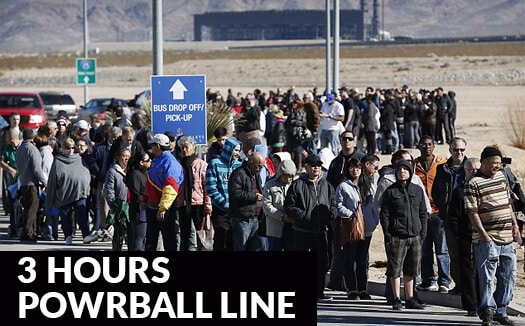
Many lottery players understand the term "rollover," but some may not fully grasp it. When no one wins the jackpot in a draw, the prize money rolls over to the next draw, increasing the potential winnings.

Lottery jackpot rollovers
Though the majority of lottery players might be familiar with the term rollover as used in the context of game drawings, there is still a significant proportion that does not have a clear understanding of the term. All of us buy lottery coupons in the hope that Lady Luck would smile at us sooner or later and we’d pocket the jackpot. More often than not, it happens that nobody holds the ticket that contains all the numbers pulled out in a draw. What happens in such an eventuality?
In the event, that nobody has the winning ticket whose numbers completely correspond with the numbers picked up in a game draw, the jackpot amount rolls over to the subsequent scheduled drawing. Simply put, this prize money which could not be claimed by anyone in the previous draw is added to the top purse in the upcoming draw. Nevertheless, the rules and regulations governing rollovers of major lottery jackpots held around the world vary.
Some raffles or sweepstakes have jackpots that remain capped or fixed at a specific amount while others have a prefixed rollover limit which when attained stays constant. Then again, there are lotteries, like the UK Lotto which is a multistate lottery where the jackpot keeps on rolling till somebody claims it.
The very fact that the top purse in a game draw is allowed to roll over to the subsequent drawing is what makes the sweepstake incredibly engrossing. The best thing about a rollover is that the purse contributes towards augmenting the value of the jackpot for the succeeding draw. Funds and proceeds from the sale of tickets from the preceding all go towards enhancing the jackpot takings.
If and when the jackpot continues to roll over even for a few months, the amount assumes an astronomical value, to say the least. No wonder, then more and more people are lured into buying tickets in the hope of making a windfall. After all, a sweepstake whose jackpot continues to burgeon will naturally generate more interest compared to a draw where the top prize stays static.
It does not need to be emphasized that when the jackpot amount continues to inflate gradually, excitement tends to grow and mushroom concomitantly. Both steadfast and spur-of-the-moment players cannot resist the temptation of purchasing as many tickets as possible in the hope that one of these coupons could turn out to be their passport to fame and glory. A rolling jackpot fosters a high level of publicity causing players to endlessly debate on the outcome.
There have been several instances in global lottery history where fly-by-night syndicates were formed solely to garner the top purse. Often these syndicates operate on a transnational basis where the syndicate members buy tickets in bulk that contain almost all the possible winning combinations. Once the jackpot and other key prizes are pocketed by a syndicate, all the members receive a share of the proceeds.

The crux of the matter is that when a jackpot remains unclaimed in a particular drawing, rolling over to the next scheduled sweepstakes, a large number of people are encouraged to purchase slips. This leads to increased ticket sales as more people wish to gamble with the odds of pocketing the top purse. Consequently, an individual’s chances or odds of winning the jackpot go down tremendously.
Additionally, the likelihood of winning a 2nd tier or 3rd tier purse or other prizes in the lower rungs also drives people to purchase tickets online or from retail agents.
Once a jackpot attains the peak or the ceiling limit following multiple rollovers, the procedure followed for dealing with the course of events varies from one lottery to another. For instance, the EuroMillions jackpot is capped at €190 million and so when this figure is reached, the topmost purse remains fixed at this value. So whatever extra funds are generated that could have helped the jackpot to become more inflated are carved up by the players in the subsequent tier.
The EuroMillions jackpot can roll over a maximum of three times and if the fourth round produces no winner, the purse is shared amongst the top tier winners and players. The cap for the Lotto jackpot is £22 million and this amount has to be claimed by a ticket holder in the 4th rollover. If the 4th rollover draw does not produce a winner, then the prize rolls down to the next layer.
If a clear winner emerges in this round, then the jackpot is distributed between winners from the previous tier and winning participants in the subsequent tier.
You never know whether a jackpot will roll down once, twice, thrice or four times. However, you will able to ascribe a term to underscore the numerical figure of the rollover. For instance, a top purse that has rolled over three times is called a triple or treble or a jackpot that has rolled down to the fifth draw is known as a quintuple. But even this system according to a name becomes complex as the frequency of rollovers increases.
Do you know the term used for a jackpot that has rolled over 15 times or 18 times for that matter? In reality, however, organizers rarely use the exact terminology for a jackpot that has rolled beyond the sixth draw. They feel more comfortable using expressions like “6x rollover” or “8x rollover” and so on.
The most lingering rollover in the history of UK Lotto started in 2015 on 14th November (Saturday) and continued to roll till 9th January 2016 (again a Saturday) resulting in 15 rollovers. A player pocketed £4.3 million in the first rollover while the jackpot of £66 million for the 15th rollover was divided between David and Carol Martin of Scottish Borders and one unnamed player from Worchester.